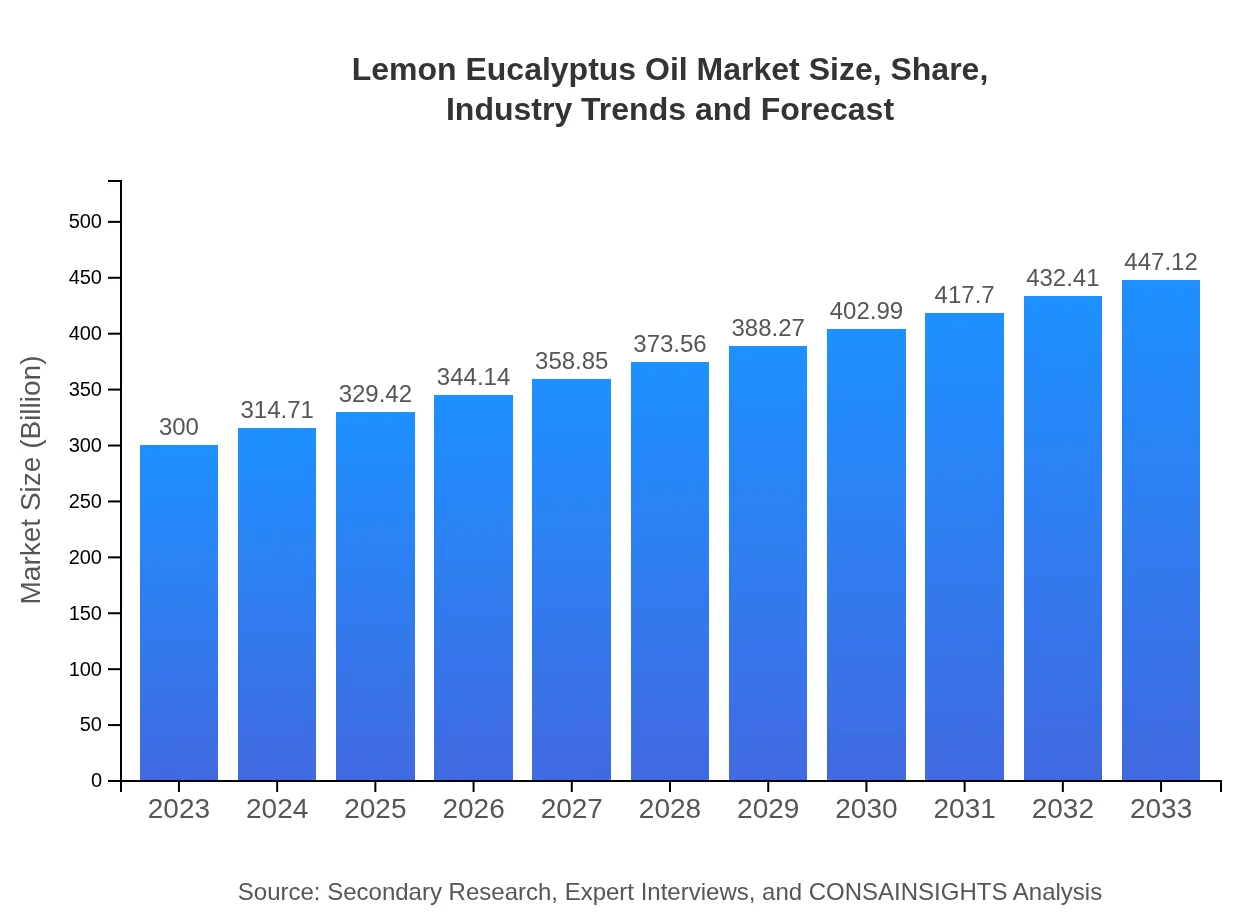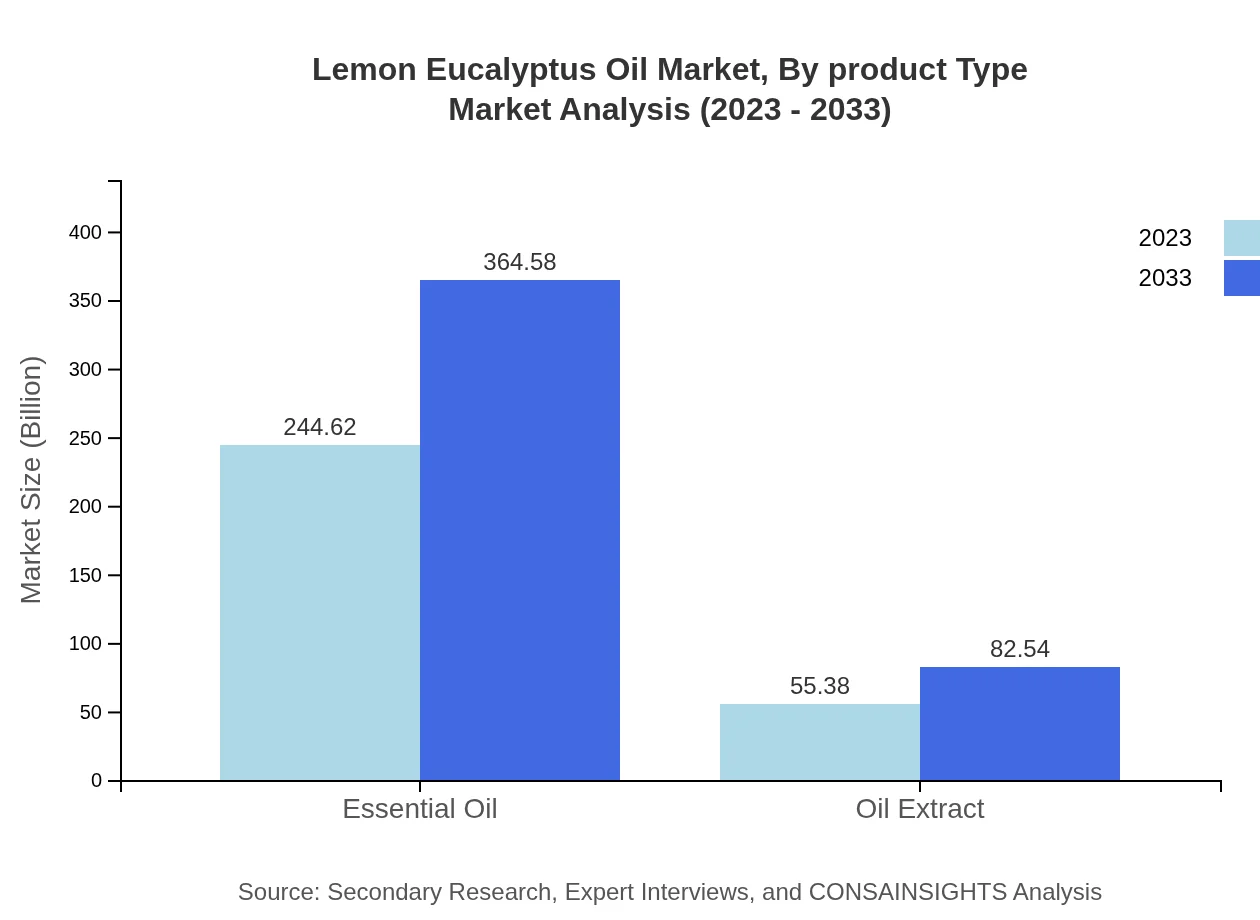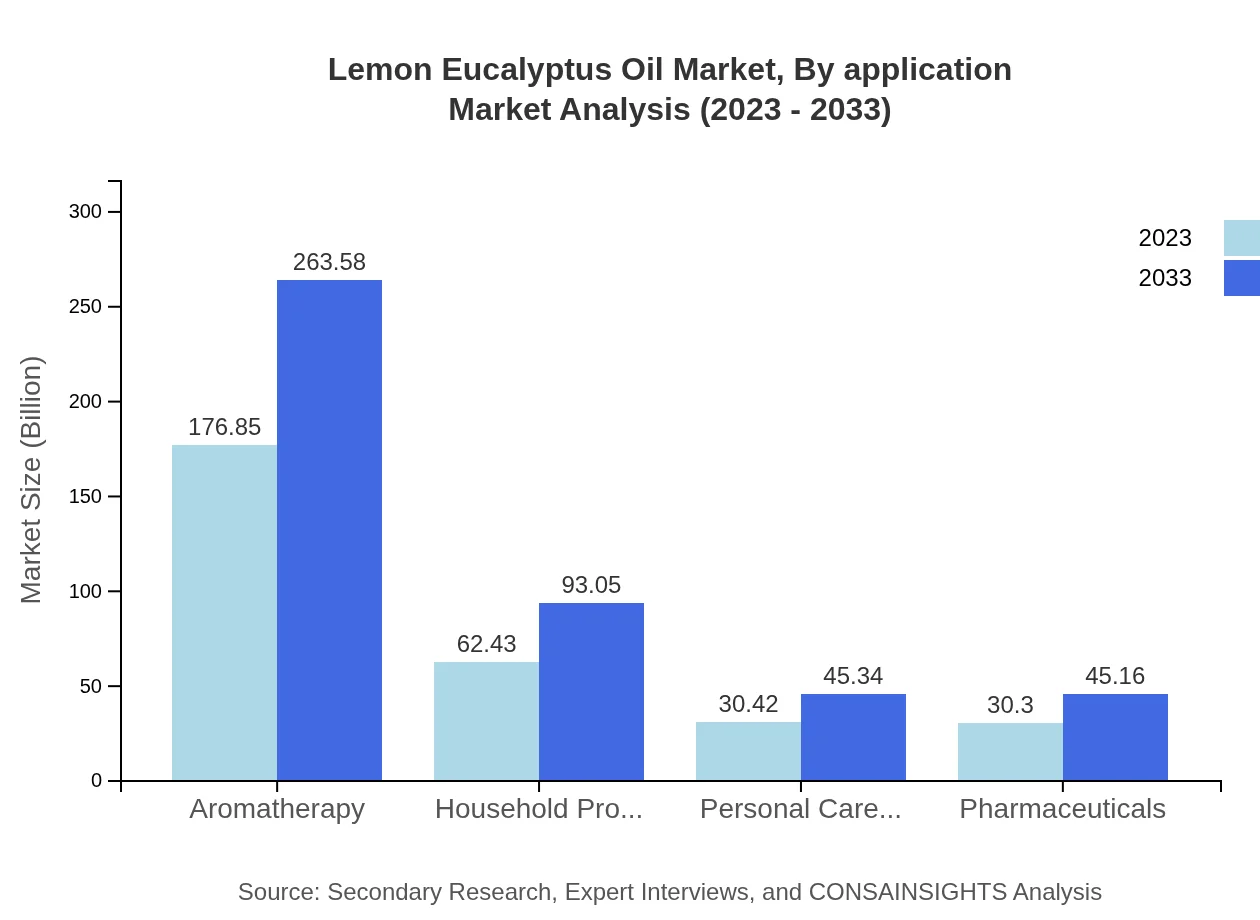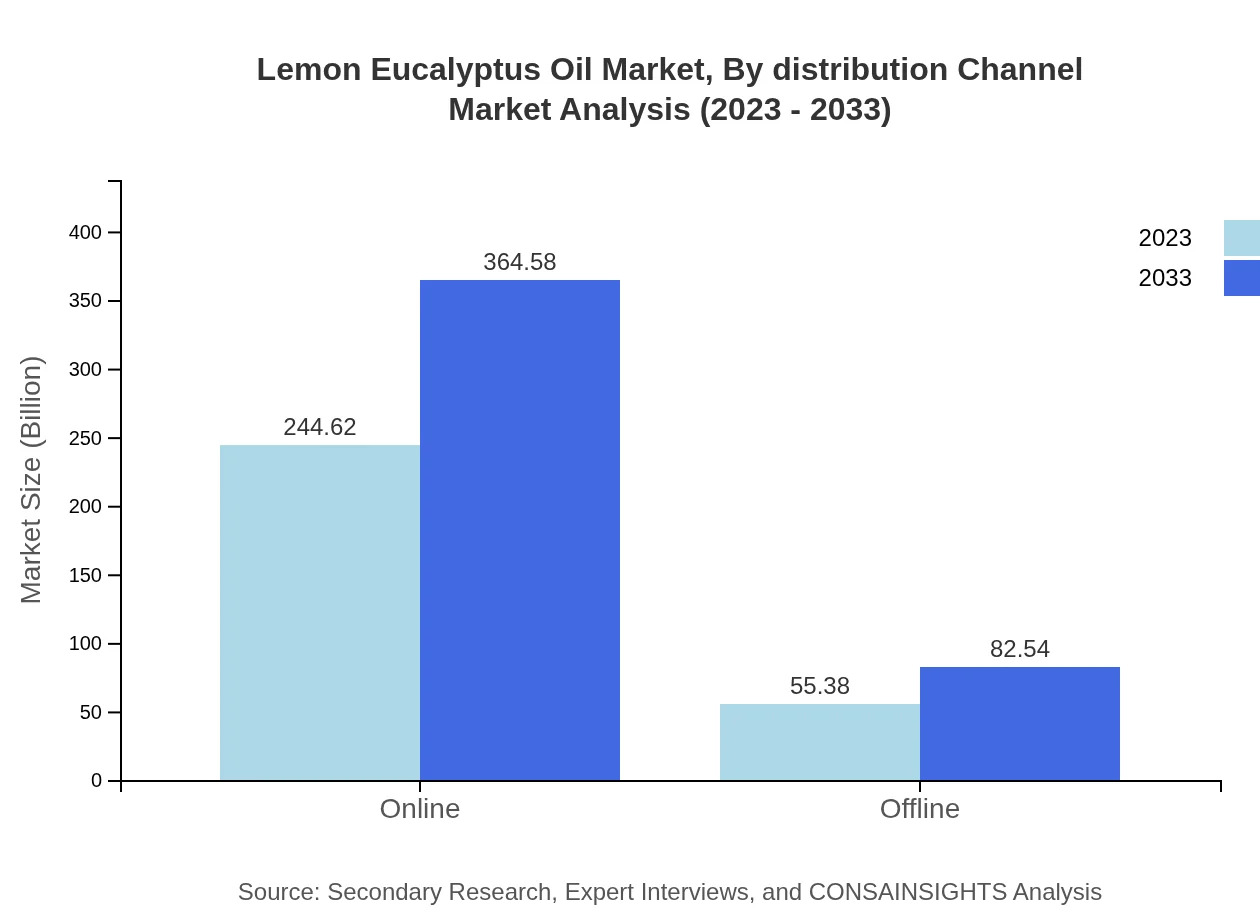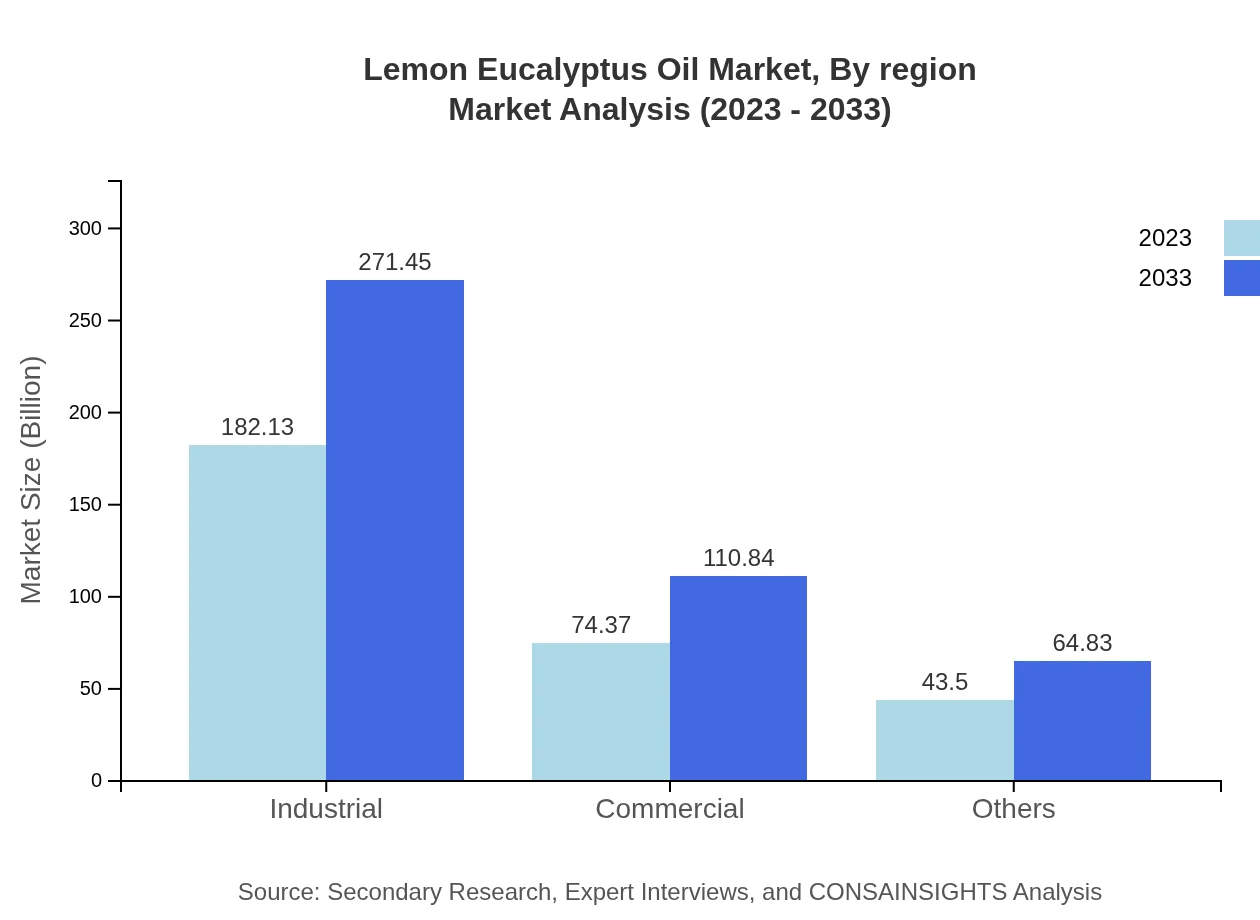Lemon Eucalyptus Oil Market Report
Published Date: 31 January 2026 | Report Code: lemon-eucalyptus-oil
Lemon Eucalyptus Oil Market Size, Share, Industry Trends and Forecast to 2033
This report provides an in-depth analysis of the Lemon Eucalyptus Oil market, including comprehensive insights, trends, and forecasts from 2023 to 2033. It details market size, growth rates, segmentation, regional analysis, and leading players in the industry.
| Metric | Value |
|---|---|
| Study Period | 2023 - 2033 |
| 2023 Market Size | $300.00 Million |
| CAGR (2023-2033) | 4.0% |
| 2033 Market Size | $447.12 Million |
| Top Companies | Young Living Essential Oils, doTERRA, Plant Therapy, Edens Garden |
| Last Modified Date | 31 January 2026 |
Lemon Eucalyptus Oil Market Overview
Customize Lemon Eucalyptus Oil Market Report market research report
- ✔ Get in-depth analysis of Lemon Eucalyptus Oil market size, growth, and forecasts.
- ✔ Understand Lemon Eucalyptus Oil's regional dynamics and industry-specific trends.
- ✔ Identify potential applications, end-user demand, and growth segments in Lemon Eucalyptus Oil
What is the Market Size & CAGR of Lemon Eucalyptus Oil market in 2023?
Lemon Eucalyptus Oil Industry Analysis
Lemon Eucalyptus Oil Market Segmentation and Scope
Tell us your focus area and get a customized research report.
Lemon Eucalyptus Oil Market Analysis Report by Region
Europe Lemon Eucalyptus Oil Market Report:
The European market for Lemon Eucalyptus Oil is anticipated to expand from $83.37 million in 2023 to $124.26 million by 2033. Contributing factors include the rising trend of aromatherapy and natural ingredients in cosmetics, driving an increase in product consumption.Asia Pacific Lemon Eucalyptus Oil Market Report:
The Asia Pacific region is a prominent contributor to the Lemon Eucalyptus Oil market, with a market size of $62.13 million in 2023, projected to reach $92.60 million by 2033. The rapid urbanization and growing awareness of natural alternatives have fueled demand, particularly in countries like China and India.North America Lemon Eucalyptus Oil Market Report:
North America stands as a leading market for Lemon Eucalyptus Oil, projected to grow from $101.55 million in 2023 to $151.35 million by 2033. The increasing demand for organic and natural products, along with extensive use in personal care and aromatherapy applications, propels market growth.South America Lemon Eucalyptus Oil Market Report:
In South America, the Lemon Eucalyptus Oil market is valued at $18.33 million in 2023, with expectations to grow to $27.32 million by 2033. The market is driven by the rising interest in wellness and natural health products among consumers in this region.Middle East & Africa Lemon Eucalyptus Oil Market Report:
The Middle East and Africa market is expected to grow from $34.62 million in 2023 to $51.60 million by 2033. The growing inclination towards natural and organic products in personal care and household applications drives this market.Tell us your focus area and get a customized research report.
Lemon Eucalyptus Oil Market Analysis By Product Type
In 2023, the Essential Oil segment dominates the Lemon Eucalyptus market, representing a significant market share. With an expected size of $244.62 million in 2023, this segment is projected to grow to $364.58 million by 2033, reflecting its importance in various applications, especially in aromatherapy and cosmetics.
Lemon Eucalyptus Oil Market Analysis By Application
The Aromatherapy segment leads the market with a size of $176.85 million in 2023, growing to $263.58 million in 2033. This highlights the rising consumer interest in therapeutic uses. The Household Products and Personal Care segments also hold significant shares, indicating diverse applications.
Lemon Eucalyptus Oil Market Analysis By Distribution Channel
The Lemon Eucalyptus Oil market is driven by online sales, projected to grow from $244.62 million in 2023 to $364.58 million by 2033. Conversely, offline distribution channels remain significant, with expected growth from $55.38 million to $82.54 million within the same period, reflecting varied consumer shopping preferences.
Lemon Eucalyptus Oil Market Analysis By Region
The Industrial segment also showcases potential, with a projected growth of market size from $182.13 million in 2023 to $271.45 million by 2033, emphasizing its extensive application in commercial settings.
Lemon Eucalyptus Oil Market Trends and Future Forecast
Tell us your focus area and get a customized research report.
Global Market Leaders and Top Companies in Lemon Eucalyptus Oil Industry
Young Living Essential Oils:
A leader in the essential oils industry, Young Living offers premium quality Lemon Eucalyptus Oil sourced from sustainable farms.doTERRA:
Known for its therapeutic-grade essential oils, doTERRA has a significant market presence and focuses on quality and sustainability.Plant Therapy:
Plant Therapy specializes in highly pure essential oils and has gained customer loyalty through transparency and educational resources.Edens Garden:
A prominent supplier of essential oils, Edens Garden emphasizes natural products and eco-friendly practices in its operations.We're grateful to work with incredible clients.









FAQs
What is the market size of lemon Eucalyptus Oil?
The global lemon eucalyptus oil market is valued at approximately $300 million in 2023, with a projected CAGR of 4.0%, suggesting steady growth driven by diverse applications in aromatherapy, personal care, and household products.
What are the key market players or companies in this lemon Eucalyptus Oil industry?
Key players in the lemon eucalyptus oil market include major fragrance and essential oil manufacturers, with a concentration on companies that specialize in natural and organic products, catering to a growing demand for sustainable and plant-based materials.
What are the primary factors driving the growth in the lemon Eucalyptus Oil industry?
Growth factors include increasing consumer awareness of natural products, rising demand for eco-friendly options in personal care, and the medicinal properties of lemon eucalyptus oil which are gaining traction across various health sectors.
Which region is the fastest Growing in the lemon Eucalyptus Oil?
The Asia Pacific region exhibits the fastest growth in the lemon eucalyptus oil market, with an increase from $62.13 million in 2023 to $92.60 million by 2033, driven by expanding markets for wellness and eco-friendly products.
Does ConsaInsights provide customized market report data for the lemon Eucalyptus Oil industry?
Yes, ConsaInsights offers customized market report data tailored to specific needs in the lemon eucalyptus oil industry, allowing clients to derive actionable insights based on specialized market segments, regional analyses, and consumer trends.
What deliverables can I expect from this lemon Eucalyptus Oil market research project?
Expect comprehensive deliverables including detailed market size reports, forecasts, trend analyses, competitive landscape overviews, and insights into consumer behavior and product segmentation, supporting strategic decision-making.
What are the market trends of lemon Eucalyptus Oil?
Current trends in the lemon eucalyptus oil market include a surge in aromatherapy use, heightened interest in organic and natural agents, and a significant increase in online sales channels, indicating a shift in consumer purchasing behavior.

